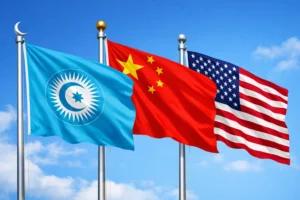The Spirit of China’s Five Principles of Peaceful Coexistence

On June 28, the Great Hall of the People in Beijing hosted a significant event celebrating the 70th anniversary of the Five Principles of Peaceful Coexistence. In his speech, President Xi Jinping articulated the essence of these principles, emphasizing their crucial role in promoting global peace and progress. Titled “Carrying Forward the Five Principles of Peaceful Coexistence and Jointly Building a Community with a Shared Future for Mankind,” his address highlighted China’s steadfast commitment to global peace and development. This high-level commemoration highlighted not only China’s dedication to the common welfare of humanity but also its important role among developing nations.
The enduring relevance of the Five Principles of Peaceful Coexistence has demonstrated remarkable resilience and universal applicability over the past 70 years. These principles have guided the establishment and development of relations between countries with different social systems, fostering an open and inclusive global environment. The principles—mutual respect, equality, non-aggression, non-interference, and peaceful coexistence—embody the essence of equality, mutual benefit, and mutual respect. Since being proposed by Chinese leadership in the 1950s, they have been the cornerstone of China’s independent foreign policy.
These principles represented an important international public good provided by China, contributing Chinese wisdom to the development and improvement of the international order. They quickly expanded from Asia to the world, standing the test of changing international situations, and effectively safeguarding the rights and interests of other developing countries. The Five Principles have also applied to bilateral relations between countries and have gradually been adopted by various international documents. They have demonstrated that differences in social systems, development levels, and ideologies are fundamental principles of international relations and international law.
Significance of the Five Principles of Peaceful Coexistence
For developing countries, this ideology serves as a powerful tool to defend national sovereignty and independence. China’s profound engagement with the Global South, including infrastructure projects like the Belt and Road Initiative, and strategic measures to bolster the development of the Global South, showcasing China’s commitment to fostering international cooperation. Through championing these initiatives, China is demonstrating its dedication to a more equitable world and providing the Global South with opportunities for revitalization and self-sufficiency.
Practicing the Five Principles of Peaceful Coexistence and working together to build a community with a shared future for mankind has been accepted by more and more countries around the world. The vigorous development of countries in the Global South has convinced the world that the continued growth of a community with a shared future for mankind is the most powerful guarantee for human peace and prosperity. China has and will continue to consolidate the common interests of developing countries and seek a global development partnership that is united, equal, balanced, and inclusive.
The Five Principles have long been enshrined in China’s Constitution and have become the cornerstone of China’s independent foreign policy of peace. It is by adhering to the general line of independence and peace that China has firmly defended its sovereignty, security, and development interests and made significant contributions to the cause of world peace and development. As an open and inclusive principle of international law, the Five Principles embody the values of sovereignty, justice, democracy, and the rule of law. Its essence lies in its full equality of national sovereignty and the fact that countries with different social systems can achieve peaceful coexistence and friendly cooperation.
China has consistently advocated for the Five Principles, which align closely with the aims and objectives of the UN Charter and provide a tangible framework for promoting peace and cooperation on a global scale. These principles not only reflect the aspirations of Asian countries for international relations but also embody the spirit of international law that should guide the rights, obligations, and responsibilities of all nations. Indeed, the Five Principles safeguard the rights and interests of developing countries. The essence of the Five Principles of Peaceful Coexistence is that all countries have equal sovereignty and oppose any country’s monopoly on international affairs.
At present, regional conflicts are intensifying, major power competition is rising, and geopolitical factors are becoming more complex. In the face of such a turbulent and changing world, the international community needs to draw more political wisdom from the Five Principles of Peaceful Coexistence.
Seventy years on, China is facing the historical choice between peace and war, and between prosperity and decline. It has presented the international public good of building a community with a shared future for mankind, reflecting China’s unique perspectives on the direction of human development and making steady progress in practice. The joint development of the Belt and Road Initiative, the Global Development Initiative, the Global Security Initiative, and the Global Civilization Initiative has taken root, bringing prosperity and stable development expectations to the international community and creating tangible benefits for people’s livelihoods.
Developing countries must prioritize the principles of peaceful development and unite to enhance their role and expand their development opportunities. In navigating the new international environment, promoting and achieving peaceful development through multilateralism is vital. More and more countries and people are realizing that this concept serves the common interests of all humankind and brings together the greatest common ground for building a better world.


